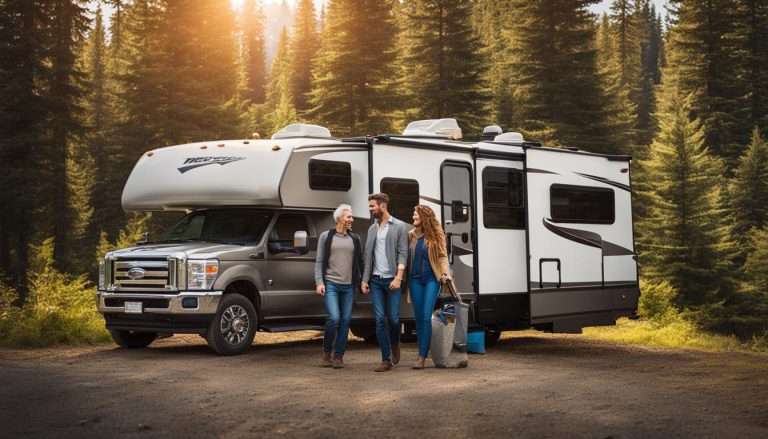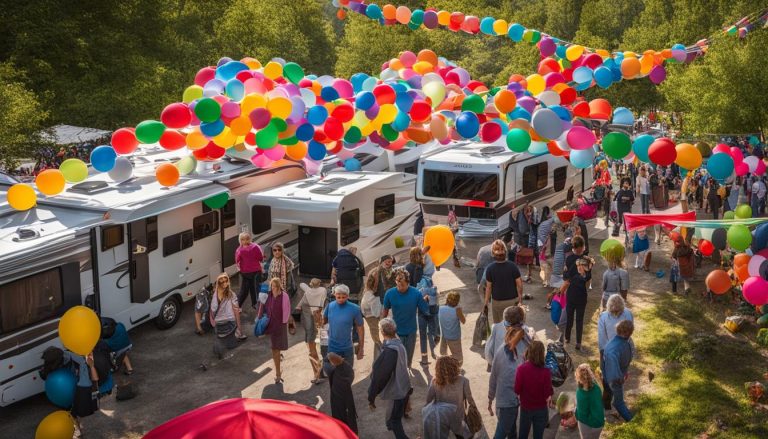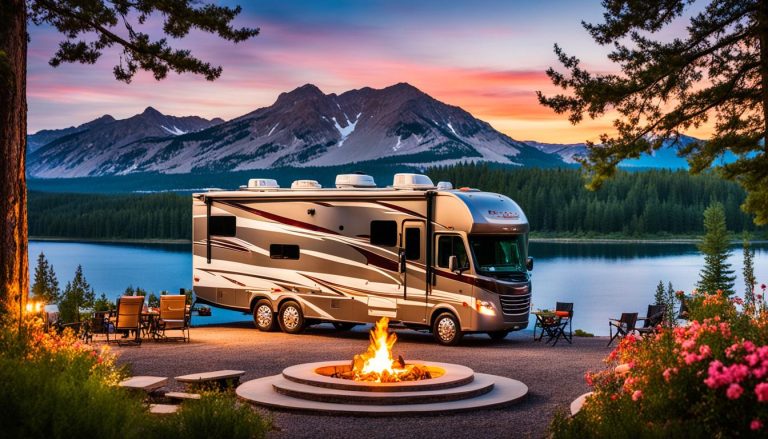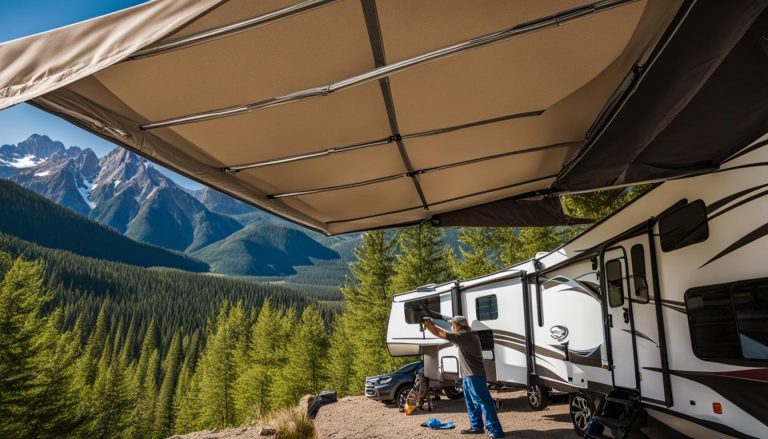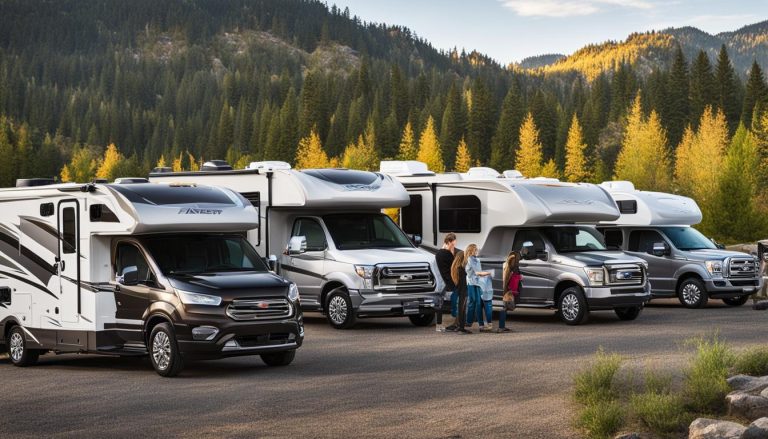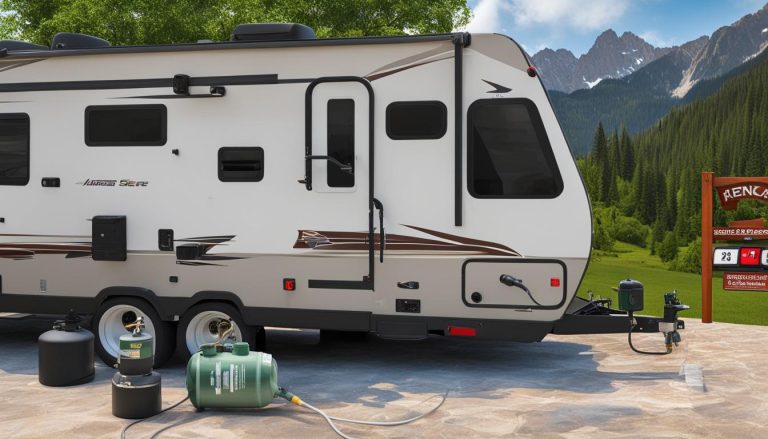Full-Time RV Living Guide: Tips & Essentials
gorvlifestyle.com and its partners may earn a commission if you purchase a product through one of our links
Living full-time in an RV can be a rewarding and fulfilling experience. It offers freedom, flexibility, and the opportunity to travel and explore new places. If you’re considering transitioning to full-time RV living, this guide will provide you with essential tips and advice to help you make the most of your RV lifestyle.
Key Takeaways
- Learn how to live full-time in an RV and embrace the freedom it offers.
- Discover essential tips and advice to make the most of your RV lifestyle.
- Understand the costs associated with full-time RV living and budget accordingly.
- Explore the benefits of full-time RV living, from saving money to experiencing new places.
- Get started with RV living by researching, downsizing, and embracing a flexible mindset.
- Learn how to live full-time in an RV and embrace the freedom it offers.
- Discover essential tips and advice to make the most of your RV lifestyle.
- Understand the costs associated with full-time RV living and budget accordingly.
- Explore the benefits of full-time RV living, from saving money to experiencing new places.
- Get started with RV living by researching, downsizing, and embracing a flexible mindset.
RV Living Costs: Understanding the Expenses
Living in an RV full-time comes with its own unique set of expenses. Understanding these costs will help you plan and budget for your RV lifestyle. Some of the main costs to consider include the cost of purchasing an RV, park fees, utilities, maintenance, insurance, roadside assistance, fuel, activities, RV memberships, groceries, eating out, internet, laundry, entertainment subscriptions, propane, water, and sewer. By factoring in these expenses, you can get a clear picture of the financial commitment required for full-time RV living.
When it comes to full-time RV living, it’s important to have a realistic understanding of the costs involved. Let’s break down some of the key expenses to consider:
1. Purchasing an RV
The cost of purchasing an RV can vary widely depending on the type, size, and age of the vehicle. New RVs can range from $50,000 to over $500,000, while used RVs can be found at lower prices. Consider your budget and desired features when selecting an RV.
2. Park Fees
If you plan to stay at RV parks or campgrounds, you will need to budget for park fees. These fees can vary depending on the location, amenities, and duration of your stay. Monthly rates typically range from $300 to $1,500 or more.
3. Utilities
Utilities such as electricity, water, and sewer will add to your monthly expenses. While some RV parks include these utilities in their fees, others may charge extra. On average, expect to pay around $100 to $200 per month for utilities.
4. Maintenance
Maintaining your RV is essential for its longevity and reliability. Regular maintenance tasks include oil changes, tire rotations, and inspections. Budgeting around $1,000 to $2,000 per year for RV maintenance is a good rule of thumb.
5. Insurance
Protecting your investment with RV insurance is important. Insurance costs will vary depending on factors such as your location, driving history, and the type of RV you own. On average, expect to pay between $1,000 and $2,500 per year for RV insurance.
6. Roadside Assistance
Having roadside assistance coverage is crucial for peace of mind while traveling. The cost of roadside assistance can range from $100 to $300 per year.
7. Fuel
Fuel costs will vary depending on the size of your RV, the distance traveled, and current fuel prices. On average, RV owners can expect to spend between $200 and $400 per month on fuel.
8. Activities
Exploring new places and participating in activities can add to your RV living expenses. Budgeting for activities such as sightseeing, hiking, and dining out will depend on your personal preferences and the locations you visit.
9. RV Memberships
Joining RV clubs and memberships can provide access to discounts and exclusive benefits. Membership costs can range from $50 to $200 per year.
10. Groceries and Eating Out
Food expenses will vary depending on your cooking and eating habits. While cooking your meals in your RV can help save money, dining out occasionally adds to the overall expenses. Budgeting around $300 to $500 per month for groceries and dining out is a good estimate.
11. Internet
Staying connected on the road is important for many RVers. Internet costs will depend on your preferred connectivity options, such as mobile hotspot plans or campground Wi-Fi. Expect to budget around $50 to $100 per month for internet.
12. Laundry
Laundry costs can add up over time, especially if you don’t have access to an RV washer and dryer. Budgeting around $20 to $50 per month for laundry expenses is a good guideline.
13. Entertainment Subscriptions
If you enjoy streaming movies, TV shows, or music, consider budgeting for entertainment subscriptions such as Netflix, Hulu, or Spotify. These costs typically range from $10 to $20 per month.
14. Propane, Water, and Sewer
Budgeting for propane, water, and sewer expenses is important for maintaining your RV’s essential systems. Plan to spend around $50 to $100 per month on propane, and consider budgeting an additional $50 to $100 for water and sewer expenses.
RV living costs can vary depending on factors such as your lifestyle, travel plans, and RV choices. By considering these expenses and budgeting accordingly, you can ensure a more realistic financial plan for full-time RV living.
Remember to adjust these estimates based on your personal preferences, travel plans, and the specific details of your RV lifestyle. By understanding and planning for these expenses, you can embark on your full-time RV living journey with confidence.
The Benefits of Full-Time RV Living
Living full-time in an RV offers a multitude of benefits for those seeking a unique and fulfilling lifestyle. Whether you’re an adventurous traveler or simply looking to simplify your life, the advantages of RV living are undeniable.
1. Live with Less and Save Money
One of the greatest benefits of full-time RV living is the opportunity to live with less. Downsizing to a smaller living space encourages a minimalist mindset and allows you to prioritize experiences over material possessions. With reduced expenses in areas such as rent or mortgage payments, utilities, and excessive belongings, you can save a significant amount of money to put towards fulfilling your travel dreams.
2. Experience New Places and Cultures
By embracing the full-time RV lifestyle, you have the freedom to explore new places and immerse yourself in different cultures. From coastal towns to majestic national parks, there’s no limit to the destinations you can discover. Wake up to breathtaking views, visit hidden gems off the beaten path, and create lasting memories as you embark on exciting adventures.
3. Travel at Your Own Pace
RV living grants you the freedom to travel at your own pace, without the constraints of set itineraries or rigid schedules. Enjoy the flexibility of staying longer in a place that captivates you or moving on to the next destination when you’re ready. This complete control over your travel plans allows for spontaneous detours and the ability to truly immerse yourself in each location.
4. Connect with Nature
Living in an RV full-time enables you to connect with nature on a deeper level. Wake up to the sounds of birds chirping, breathe in the fresh mountain air, and fall asleep under a blanket of stars. Whether you’re hiking through national parks, camping by pristine lakes, or enjoying cozy evenings around a campfire, the RV lifestyle offers abundant opportunities to appreciate the beauty and tranquility of the natural world.
5. Work Remotely
The full-time RV lifestyle aligns perfectly with remote work opportunities. With advancements in technology and the increasing availability of internet connectivity, more and more individuals are able to work remotely from the comfort of their RV. This flexible work environment allows you to maintain a steady income while enjoying the freedom and adventure that comes with RV living.
6. Sense of Community and Amenities
RV parks and campgrounds often provide a sense of community and a range of amenities that can enhance your RV living experience. From organized activities and social gatherings to well-maintained facilities and convenient services, these spaces offer the opportunity to meet like-minded individuals, share stories, and forge lasting connections. Embrace the camaraderie and support of your fellow RV enthusiasts as you navigate the joys of full-time RV living.
Embarking on a full-time RV lifestyle presents a world of possibilities. Whether you’re seeking adventure, simplicity, or a change of scenery, the benefits of RV living are endless. Live with less, explore new places, create your own path, and connect with nature – all while enjoying the comforts and conveniences of home on wheels.
Tips for Full-Time Stationary RV Living
Full-time stationary RV living refers to the lifestyle choice of living in an RV full-time in one location. While it offers the freedom and flexibility of RV living, it also comes with its own set of considerations. To make the most of your full-time stationary RV experience, here are some helpful tips:
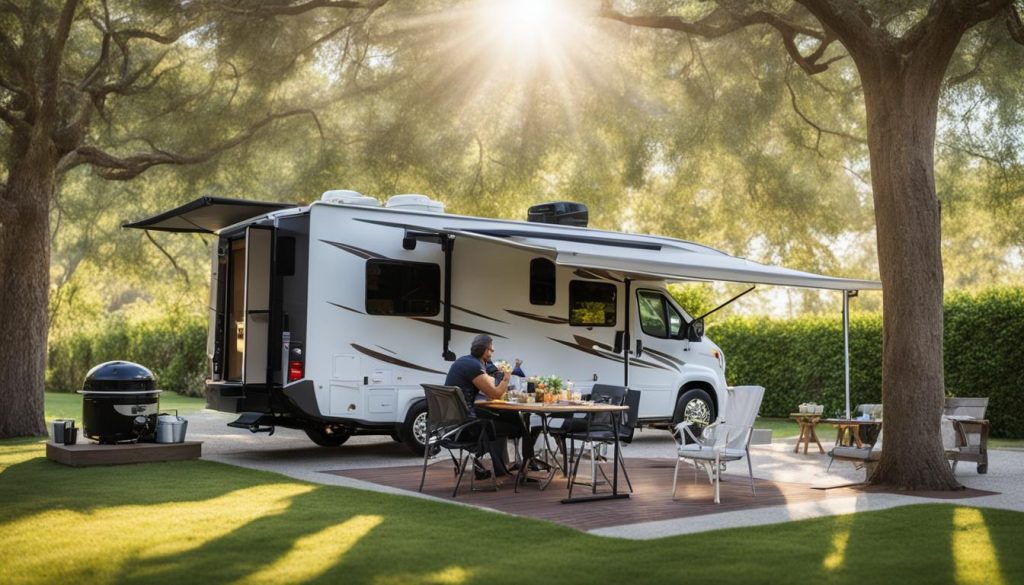
- Choose the Right RV Park or Campground: Research and select an RV park or campground that suits your needs and preferences. Consider the location, amenities, and accessibility to nearby attractions.
- Optimize Your Wi-Fi Signal: Reliable internet connectivity is crucial for staying connected and working remotely. Invest in a Wi-Fi booster or antenna to enhance the signal strength within your RV.
- Add Insulation for Winter Climates: If you plan to stay in colder regions during winter, add insulation to your RV to improve energy efficiency and keep it warm and cozy.
- Maximize Your Storage Space: Make use of storage solutions such as under-bed storage containers, hanging organizers, and collapsible items to maximize the available space in your RV.
- Utilize Efficient Kitchen Tools and Appliances: Opt for space-saving kitchen tools and appliances that are specifically designed for RV living. This will help you optimize your kitchen space and make cooking easier.
- Set Up a Mail Forwarding Service: Establish a mail forwarding service to ensure you receive important mail and packages while on the road. This will help you stay connected to your regular postal address.
- Stay on Top of RV Maintenance Tasks: Regularly inspect and maintain your RV to prevent any potential issues. This includes checking the tires, fluid levels, and ensuring all systems are in good working order.
- Consider the Size of Your RV: When choosing an RV, consider the size and maneuverability for your chosen location. A smaller RV may offer more flexibility in terms of campsite options.
- Create an Outdoor Hangout Space: Enhance your outdoor living area by setting up a cozy hangout space. This can include outdoor furniture, a grill, and decorative elements to create a relaxing atmosphere.
- Be Open to Relocating if Necessary: While the intention may be to stay in one place, circumstances might require you to relocate. Stay open to the possibility of moving to a new location based on changing needs or preferences.
By following these tips, you can navigate the full-time stationary RV living lifestyle with ease and create a comfortable and enjoyable home on wheels.
Getting Started with RV Living: Beginner Tips
If you’re new to the world of RV living, there are a few key tips to keep in mind as you embark on your full-time RV journey. These beginner tips will help you navigate the exciting world of RV living and make the most of your full-time RV life.
1. Get to Know Your RV
Before you hit the road, take the time to familiarize yourself with your RV and its systems. Understanding how everything works will make your RV life much easier and more enjoyable. Learn about the electrical and plumbing systems, how to operate the appliances, and the essentials of RV maintenance. This knowledge will come in handy when you encounter any issues while on the road.
2. Do Thorough Research and Planning
Proper research and planning are crucial for a successful full-time RV life. Research different RV models and types to find the one that best fits your needs and budget. Plan your routes and destinations, taking into consideration the availability of RV-friendly campsites and attractions along the way. This will help you make the most of your RV adventures and avoid unnecessary stress.
3. Establish a Domicile and Secure Insurance
Establishing a domicile, or legal residence, is necessary for full-time RV living. Select a state where you will establish your legal residency and handle important matters such as driver’s licenses, vehicle registrations, and mail forwarding services. Additionally, secure appropriate insurance coverage for your RV to protect your investment and ensure peace of mind while on the road.
4. Downsize Your Belongings
Living in an RV requires downsizing and simplifying your belongings. Assess what is essential and what can be let go of. Consider the available storage space in your RV and prioritize the items that are truly necessary for your lifestyle. By keeping a minimalist approach, you’ll have more space to move around and enjoy the freedom of the open road.
5. Create a Checklist
Prior to traveling, create a checklist to ensure that everything is in its place and properly secured before hitting the road. This will help you stay organized and avoid any mishaps along the way. Include items such as checking the tire pressure, securing loose items, disconnecting utilities, and double-checking your RV’s systems. A checklist will provide peace of mind and make your travels much smoother.
6. Prioritize Communication
Effective communication is essential when living in an RV, especially if you’re traveling with others. Prioritize open and clear communication with your travel companions to avoid misunderstandings and ensure everyone’s needs are met. Use technology such as walkie-talkies or cell phones with reliable coverage to stay connected, especially during the setup and breakdown processes at campsites.
7. Expect the Unexpected
When living on the road, it’s important to be prepared for unexpected situations and emergencies. Pack a well-stocked first aid kit, know the location of nearby medical facilities, and have emergency contact numbers readily available. Additionally, embrace a flexible mindset and be open to change and adaptability. RV living is an adventure, and flexibility is key to making the most of your experiences.
By following these beginner tips for RV living, you’ll be well-equipped to start your full-time RV life on the right foot. Embrace the freedom, flexibility, and endless possibilities that come with living in an RV, and get ready for a life of exciting adventures and memorable experiences.
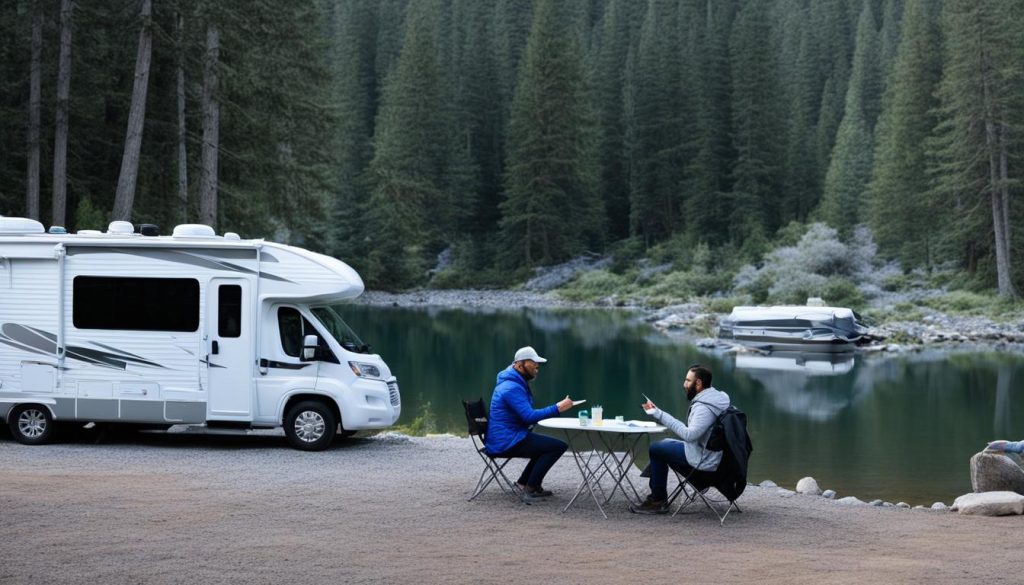
The Importance of RV Maintenance for Full-Time Living
When it comes to full-time RV living, proper maintenance is essential to ensure that your RV remains in top-notch condition. Regular upkeep not only extends the lifespan of your vehicle but also reduces the risk of breakdowns and costly repairs. By dedicating time to maintenance tasks, you can enjoy a worry-free travel experience on the road.
Here are some critical maintenance tasks to prioritize for full-time RV living:
- Checking and maintaining tires: Regularly inspect your tires for wear and tear, and ensure they are properly inflated. Follow the manufacturer’s guidelines for rotation and replacement.
- Changing oil: Maintain your engine’s health by regularly changing the oil and filter. This helps to prevent engine damage and ensures optimal performance.
- Inspecting and repairing damage: Regularly inspect your RV for any signs of damage or wear, both inside and out. Repair any issues promptly to prevent further deterioration.
- Maintaining propane and water systems: Check and maintain your propane and water systems regularly to prevent leaks and ensure safe operation.
- Keeping up with insurance and registration: Stay up to date with your RV insurance and registration requirements to comply with legal obligations and protect your investment.
- Having a plan for roadside assistance: Prepare for emergencies by having a reliable roadside assistance plan in place. This gives you peace of mind and helps you get back on the road quickly in case of a breakdown.
Maintaining your RV for full-time travel is an ongoing commitment, but the benefits far outweigh the effort. By staying on top of regular maintenance tasks, you not only prolong the life of your RV but also minimize the chances of unexpected issues when you’re out exploring the world.
Expert Tip: Regular Inspections
“Performing regular inspections on your RV is vital to catch potential issues early on. From the roof to the chassis, pay attention to any signs of wear, leaks, or damage. By addressing these issues promptly, you can prevent major problems down the road and keep your RV in top shape.”
| Maintenance Task | Frequency | Description |
|---|---|---|
| Tire Inspection and Maintenance | Every 3 months | Check tire pressure, tread wear, and signs of damage. Rotate tires as recommended by the manufacturer. |
| Oil Change | Every 6 months or as recommended by the manufacturer | Replace engine oil and filter to ensure optimal performance. |
| Damage Inspection and Repair | Every month | Thoroughly inspect the RV for any signs of damage or wear. Repair any issues promptly. |
| Propane and Water System Check | Every month | Inspect propane tanks, lines, and water systems for leaks or malfunctions. Repair or replace components as necessary. |
| Insurance and Registration | Annually | Review and renew your RV insurance policy. Update registration documents as required. |
| Roadside Assistance Plan | Ongoing | Ensure you have a reliable roadside assistance plan that covers full-time RV living. |
Overcoming Challenges and Embracing the RV Lifestyle
Living in an RV full-time can be an exciting adventure, but it also comes with its fair share of challenges. However, with the right mindset and approach, you can overcome these challenges and fully embrace the RV lifestyle.
Adjusting to a Smaller Living Space
One of the biggest challenges of RV living is getting used to a smaller living space. It may take some time to downsize your belongings and find creative storage solutions. Embrace a minimalist mindset and focus on keeping only the essentials. By doing so, you’ll create a more organized and comfortable living environment in your RV.
Adapting to Different Climates and Weather Conditions
Traveling in an RV means you’ll experience a variety of climates and weather conditions. From scorching summer heat to freezing winter temperatures, it’s important to be prepared. Invest in proper insulation, heating, and cooling solutions for your RV. Pack appropriate clothing and gear for different weather scenarios. Stay informed about weather forecasts and plan your travels accordingly.
Maintaining Relationships with Friends and Family
Living on the road can present challenges in maintaining relationships with friends and family. However, technology makes it easier than ever to stay connected. Take advantage of video calls, social media, and other communication tools to keep in touch. Plan visits and meetups whenever possible to strengthen your bonds and create lasting memories.
Finding Reliable Internet and Communication Options
Reliable internet and communication options are essential for full-time RV living, especially if you work remotely or depend on connectivity for entertainment and staying connected. Research mobile internet solutions, invest in signal boosters or Wi-Fi extenders, and consider utilizing campground Wi-Fi or co-working spaces when available. Stay organized and have backup plans in case of connectivity issues.
Dealing with Unexpected Repairs and Emergencies
Just like any other mode of living, RV life can come with unexpected repairs and emergencies. It’s crucial to have an emergency fund set aside for these situations. Stay prepared by learning basic RV maintenance and troubleshooting skills. Have a plan in place for roadside assistance and familiarize yourself with local repair shops at your destinations.
By embracing the RV lifestyle, staying flexible, and maintaining a positive outlook, you can overcome the challenges of RV living and fully enjoy the freedom and adventure that comes with it.
| Challenges of RV Living | How to Overcome Them |
|---|---|
| Adjusting to a smaller living space | Embrace minimalism, organize and optimize storage, focus on essentials |
| Adapting to different climates and weather conditions | Invest in insulation, heating, and cooling solutions, pack appropriate clothing and gear |
| Maintaining relationships with friends and family | Utilize technology for communication, plan visits and meetups |
| Finding reliable internet and communication options | Research mobile internet solutions, invest in signal boosters, have backup plans |
| Dealing with unexpected repairs and emergencies | Have an emergency fund, learn basic maintenance skills, plan for roadside assistance |
Conclusion
Living the full-time RV lifestyle offers a unique and rewarding way of life. It provides you with the freedom to explore new places and the flexibility to create your own schedule. By understanding the costs and benefits of full-time RV living, following essential tips for RV living, staying on top of maintenance, overcoming challenges, and fully embracing the RV lifestyle, you can create an enriching and fulfilling life on the road.
Whether you’re a seasoned RVer or just starting your RV journey, the full-time RV lifestyle can offer endless adventures and memories. From breathtaking natural landscapes to vibrant cities, there is always something new and exciting to discover. Embrace the freedom of the open road, connect with nature, and enjoy all that the RV lifestyle has to offer.
So pack your bags, hop in your RV, and embark on this incredible journey. With the full-time RV lifestyle, the possibilities are endless. Create unforgettable memories, forge new friendships, and immerse yourself in the beauty that surrounds you. There’s no better time to start living your best RV life. Bon voyage!
FAQ
How much does it cost to live in an RV full-time?
The cost of living in an RV full-time can vary depending on factors such as the type and size of your RV, location, and personal lifestyle choices. Some of the main expenses to consider include the cost of purchasing an RV, park fees, utilities, maintenance, insurance, fuel, groceries, internet, and entertainment subscriptions.
What are the benefits of living in an RV full-time?
Full-time RV living offers numerous benefits, including the opportunity to live with less and save money, the freedom to travel and explore new places, the ability to work remotely, the chance to connect with nature, and the amenities and sense of community offered by RV parks and campgrounds.
Any tips for successfully navigating full-time stationary RV living?
Tips for full-time stationary RV living include choosing the right RV park or campground, optimizing your Wi-Fi signal, adding insulation for winter climates, maximizing storage space, utilizing efficient kitchen tools and appliances, setting up a mail forwarding service, staying on top of RV maintenance tasks, creating an outdoor hangout space, and being open to relocation if necessary.
What should I keep in mind as a beginner in full-time RV living?
As a beginner in full-time RV living, it’s important to get to know your RV and its systems, to do thorough research and planning before hitting the road, to establish a domicile and secure appropriate insurance, to downsize your belongings to fit your RV lifestyle, to create a checklist before traveling, to prioritize communication with travel companions, to be prepared for emergencies, and to have a flexible mindset to make the most of your RV adventures.
How important is RV maintenance for full-time living?
Regular RV maintenance is crucial for full-time living. It helps ensure your RV remains in good working condition and reduces the risk of breakdowns or costly repairs. Maintenance tasks include checking and maintaining tires, changing oil, inspecting for damage or wear, maintaining propane and water systems, keeping up with insurance and registration requirements, and having a plan for roadside assistance in emergencies.
What are some common challenges of full-time RV living?
Full-time RV living comes with challenges such as adjusting to a smaller living space, adapting to varying climates and weather conditions, maintaining relationships with friends and family, finding reliable internet and communication options, and dealing with unexpected repairs and emergencies. However, with a positive mindset, flexibility, and preparation, these challenges can be overcome.
What can I expect from the RV lifestyle?
The RV lifestyle offers freedom, flexibility, and the opportunity to explore new places. By understanding the costs and benefits of full-time RV living, following essential tips, staying on top of maintenance, overcoming challenges, and embracing the RV lifestyle, you can create an enriching and fulfilling life on the road, filled with endless adventures and memories.

